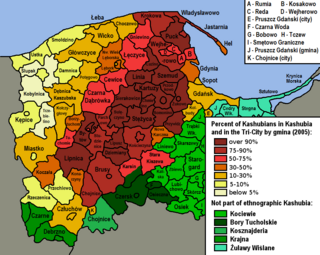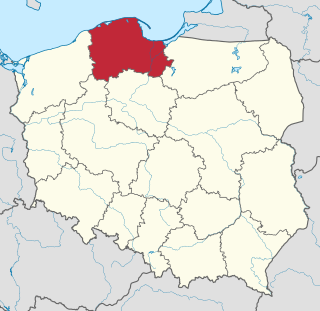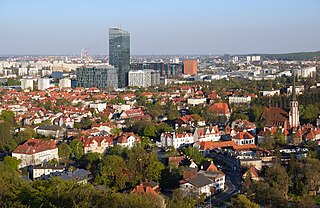
Gdańsk is a city on the Baltic coast of northern Poland, and the capital of the Pomeranian Voivodeship. With a population of 486,492, it is Poland's sixth-largest city and principal seaport. Gdańsk lies at the mouth of the Motława River and is situated at the southern edge of Gdańsk Bay, close to the city of Gdynia and resort town of Sopot; these form a metropolitan area called the Tricity (Trójmiasto), with a population of approximately 1.5 million.

Gdynia is a city in northern Poland and a seaport on the Baltic Sea coast. With an estimated population of 257 000, it is the 12th-largest city in Poland and the second-largest in the Pomeranian Voivodeship after Gdańsk. Gdynia is part of a conurbation with the spa town of Sopot, the city of Gdańsk, and suburban communities, which together form a metropolitan area called the Tricity (Trójmiasto) with around one million inhabitants.

The Kashubians, also known as Cassubians or Kashubs, are a Lechitic ethnic group native to the historical region of Pomerania, including its eastern part called Pomerelia, in north-central Poland. Their settlement area is referred to as Kashubia. They speak the Kashubian language, which is classified as a separate language closely related to Polish.

Pomerania is a historical region on the southern shore of the Baltic Sea in Central Europe, split between Poland and Germany. The central and eastern part belongs to the West Pomeranian, Pomeranian and Kuyavian-Pomeranian voivodeships of Poland, while the western part belongs to the German states of Mecklenburg-Western Pomerania and Brandenburg.

Pomeranian Voivodeship is a voivodeship, or province, in northwestern Poland. The provincial capital is Gdańsk.

Wejherowo is a city in Gdańsk Pomerania, northern Poland, with 48,735 inhabitants (2021). It has been the capital of Wejherowo County in Pomeranian Voivodeship since 1999; previously, it was a city in Gdańsk Voivodeship (1975–1998).

Kashubia or Cassubia is an ethnocultural region in the historic Eastern Pomerania (Pomerelia) region of northern Poland.

Gdańsk is one of the oldest cities in Poland. Founded by the Polish ruler Mieszko I in the 10th century, the city was for a long time part of Piast state either directly or as a fief. In 1308 the city became part of the Monastic State of the Teutonic Knights until 1454. Thereafter it became part of Poland again, although with increasing autonomy. A vital naval city for Polish grain trade, it attracted people from all over the European continent. The city was taken over by Prussia during the Second Partition of Poland in 1793 and subsequently lost its importance as a trading port. Briefly becoming a free city during Napoleonic Wars, it was again Prussian after Napoleon's defeat, and later became part of the newly created German Empire.

Oliwa is a northern district of the city of Gdańsk, Poland. From east it borders Przymorze and Żabianka, from the north Sopot and from the south with the districts of Strzyża, VII Dwór and Brętowo, while from the west with Matarnia and Osowa. It is known for its medieval monastery with the Oliwa Cathedral, the 1627 Battle of Oliwa and the 1660 Treaty of Oliva.

Strzyza is an administrative district of the city of Gdańsk, Poland, named after a creek. It is a part of the Wrzeszcz borough. Most of it is covered by small family houses.

Stefan Wyszyński was a Polish prelate of the Catholic Church. He served as Bishop of Lublin from 1946 to 1948, Archbishop of Warsaw and Archbishop of Gniezno from 1948 to 1981. He was created a cardinal on 12 January 1953 by Pope Pius XII. He assumed the title of Primate of Poland.

Gerard Labuda was a Polish historian whose main fields of interest were the Middle Ages and the Western Slavs. He was born in Kashubia. He lived and died in Poznań, Poland.

Józef Glemp was a Polish cardinal of the Catholic Church. He was Archbishop of Warsaw from 1981 to 2006, and was elevated to the cardinalate in 1983. He assumed the title of Primate of Poland following Wyszyński's death.

The resolution regarding the coat of arms of the Pomeranian Voivodeship was taken on by the Sejmik of the Pomeranian Voivodship in Gdańsk.

The Diocese of Chełmno was a Catholic diocese in Chełmno Land, founded in 1243 and disbanded in 1992.

The Archdiocese of Gdańsk is a Latin Church ecclesiastical jurisdiction or archdiocese of the Catholic Church in Poland. The diocese's episcopal see is Gdańsk.

Lech Bądkowski was a Polish writer, journalist, publicist and Kashubian-Pomeranian activist, a promoter of regional history and culture, co-founder and leader of the Kashubian-Pomeranian Association, and opponent of Communist rule in post-war Poland.

The Pomeranian Griffin secret military organization was a Polish anti-Nazi resistance group active in Pomerania and East Prussia during World War II. A major Polish resistance organization in the Pomerania region, at its height in 1943 it might have had as many as 20,000 members, although only about 500 were active partisans in the forests (leśni).

Bogdan Józef Wojtuś was a Polish Roman Catholic prelate, auxiliary bishop of the archdiocese of Gniezno from 1988 until 2012.

The Church of the Holy Polish Brothers Martyrs is a catholic temple which has been elevated to the rank of a sanctuary. It houses the relics of the "Five Saint Polish Brothers". In 1984, Father Popiełuszko celebrated there his last Holy Mass before being abducted and assassinated by members of the Security Service.





















